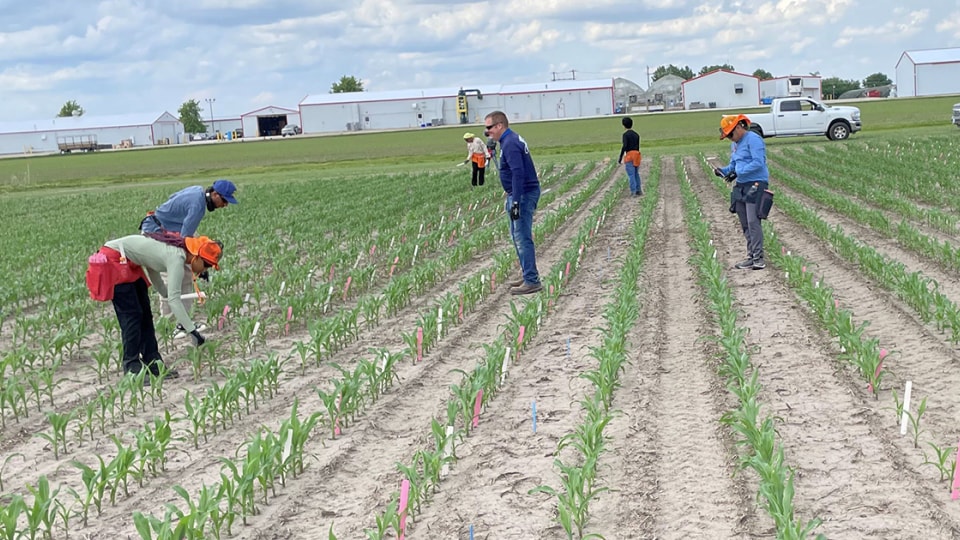- This Is Bayer
- Agriculture
- Consumer Health
- Pharmaceuticals
- Products
- Community
- News & Stories
- Careers
- This Is Bayer
- Agriculture
- Consumer Health
- Pharmaceuticals
- Products
- Community
- News & Stories
- Careers
New Survey Reveals Increased Concerns Over Food Insecurity in U.S.
While the global food crisis may seem like a distant reality for some, the U.S. is not exempt, and new research from The Harris Poll, commissioned by Bayer, confirms Americans are concerned about food insecurity.
Rising food prices, sparse grocery store aisles, and increasing food deserts all play a role in how Americans access healthy, dependable meals. Russia’s war in Ukraine, supply chain disruptions, and grain shortages have collided in a way that is threatening food security for U.S. consumers — and the world.
“Within the next three months, a quarter of a billion people will have less access to food,” says Patrick Lockwood-Taylor, President, Bayer U.S. and President, Consumer Health, North America.1 “That is starting to approach starvation conditions. As always, it is the most underserved populations who are at greatest risk. As one of the country’s leading life sciences companies, Bayer is solving for this issue head-on in pursuit of our vision of ‘Health for All, Hunger for None.’ Bayer is committed to empowering farmers on the ground by providing access to the seed and technologies they need to be most effective during this time of hardship. We must all do our part — as individuals and organizations — to help address global food security now.”
The Global Problem at Hand
The number of people facing food insecurity globally is predicted to rise as much as 240 million by November 2022.2 Russia’s war in Ukraine is creating a ripple effect for food insecurity around the world. The war has put Ukraine, one of the world’s major breadbaskets, into disarray, intensifying issues surrounding supply chain, food production, fertilizer access and energy.
Disruption for American Families
A Harris Poll was conducted to better understand how Americans feel about the emerging food crisis in the U.S.3 The poll highlights sentiment on inflation and price of goods, food waste, and access. Specifically, 71% of Americans are concerned about food shortages caused in part by Russia's invasion of Ukraine, and 69% expressed concern about seeing Americans living in “food deserts,” or areas with limited access to affordable and nutritious food.
There are more than 6,500 food deserts across the U.S., impacting more than 19 million Americans.4 Densely populated and systemically underserved communities of color are being hit the hardest. Rural Americans detached from readily available access to supermarkets are at risk as well. Furthermore, 76% of Americans indicate they are seeing more empty shelves at grocery stores now than at the beginning of 2022. The survey also revealed that 87% of Americans are particularly concerned about the rising cost of groceries, and empty shelves are amplifying these worries — this is especially pertinent among parents and Millennials.
Addressing the Issue with Action
Bayer is proud to be seeding a solution with innovative agricultural technology and continuous efforts to improve access to nutritious foods.
As a start, to cover the corn seed demand in Ukraine and beyond, Bayer will invest more than 30 million euros from 2022 onwards in the Puchuyki, Ukraine seed plant. This investment includes raising the capacity of our seeds dryer, extra field equipment, additional storage facilities — and new employment opportunities in the region.
Earlier this year, to help support Ukrainian farmers, Bayer donated more than 40,000 bags of seeds to grow food on nearly 30,000 hectares. The seeds will support 1,250 small farmers in Ukraine who have difficulty accessing input for the 2022 growing season. Bayer also continues to support Ukraine in the areas of health, education and humanitarian relief. We have donated a total of over 10 million euros so far. This includes establishing a disaster relief fund and product donations, including antibiotics and oncology therapeutics. We will also support the rebuilding of Ukraine´s hospital and public health infrastructure.
Innovation remains at the helm of Bayer’s solution. Improving access to the latest technology is a crucial component of fulfilling the company’s sustainability commitments. “You see an acceleration of innovation landing in the U.S., as we have a disproportionate burden of addressing this food crisis,” Lockwood-Taylor remarks. “It is critical that we increase access and productivity through innovation in U.S. agriculture. We cannot have lack of clarity and inconsistency in regulatory oversight. It will limit productivity.”
Bayer’s crop science division is investing in technology to improve plant fertility and seed resilience with synthetic fertilizer alternatives and is researching ways to reduce farmers’ reliance on nitrogen, which, due to its limited availability, has challenged growers this year. With Bayer’s powerful science-based regulatory system and carbon sequestration innovations, farmers can produce maximum harvests.
Equipping American farmers with breakthrough innovations and amplifying tool accessibility is critical to help close the food security gap in light of Russia’s invasion of Ukraine. Rising concerns about food access and security indicate how imperative it is for Bayer to continue to direct targeted resources to farmers, so they can feed the world.
1 Data according to the UN and the Sustainable Development Goals as related to Goal #2 Zero Hunger. Additional information available here: https://www.un.org/sustainabledevelopment/hunger
2 Data according to The Eurasia Group. Additional information available here: https://www.eurasiagroup.net/media/food-insecurity-will-affect-up-to-19-billion-people-by-november
3 The research was conducted among 2,010 adults from June 28-June 30, 2022.
4 Data according to the US Department of Agriculture. Additional information available here: https://www.ers.usda.gov/webdocs/publications/82101/eib-165.pdf?v=3395.3











